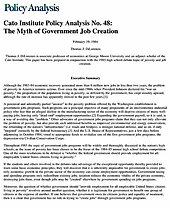A perennial and admittedly partial “answer” to the poverty problem offered by the Washington establishment is government jobs programs. Such programs are a principal objective of many proponents of an interventionist industrial policy who fear that an alleged decline in the manufacturing sector of the economy will deprive citizens of many well-paying jobs, leaving only “dead-end” employment opportunities.[2] Expanding the government payroll, so it is said, is a way of avoiding this “problem.” Other advocates of government jobs programs claim that they can not only alleviate the problem of poverty, but also provide such additional benefits as improved environmental and energy conservation, the rebuilding of the nation’s “infrastructure” (i.e. roads and bridges), a stronger national defense, and so on, if only “targeted” correctly by the federal bureaucracy.[3] And the U.S. House of Representatives, just a few days before adjourning in October 1984, voted to appropriate funds to revitalize one of the first government jobs programs, the depression-era Civilian Conservation Corps.
Throughout 1985 the topic of government jobs programs will be widely and thoroughly discussed in the nation’s high schools, as the issue of poverty has been chosen to be the focus of the 1984–85 annual high school debate competition. One of the main resolutions to be debated is “whether the federal government should provide employment for all employable United States citizens living in poverty.”
If the students and others involved in the debates take advantage of the exceptional opportunity thereby provided to learn some basic economic principles, they will discover that it is inherently impossible for government to create jobs; only economic growth in the private sector of the economy can create employment opportunities. Government taxing and spending programs only redistribute existing jobs: taxation reduces the economic vitality of the private economy, destroying jobs there, even though jobs may be “created” elsewhere by government spending on jobs programs.
Moreover, the question of whether government should “provide employment for all employable United States citizens living in poverty” revolves around another question, whether it is legitimate for government to benefit one group of citizens at the expense of another. If one believes that government owes its citizens justice and equality of treatment, then it is clear that government has no role in trying to “create jobs” through government jobs programs.
But jobs programs are politically appealing. When people are put to work through such programs the jobs are highly visible: workers know their temporary jobs have been doled out by certain politicians for whom they will therefore be more likely to vote. By contrast, the private sector jobs destroyed through taxation (to finance the jobs programs) are much less visible: the unemployed are not likely to realize that it is the higher level of taxation that has placed them on the unemployment rolls. Thus, referring to government jobs programs as a means of “creating jobs” is misleading at best, and dishonest and deceitful at worst. This is not to minimize the problem of poverty, but to suggest that government jobs programs are not the solution and in fact very often make things even worse.
The present paper will discuss the economic logic of why governments cannot create jobs and will offer evidence to support this analysis. Special attention will be paid to arguments that are likely to be encountered in the high school debates and to appropriate responses.

